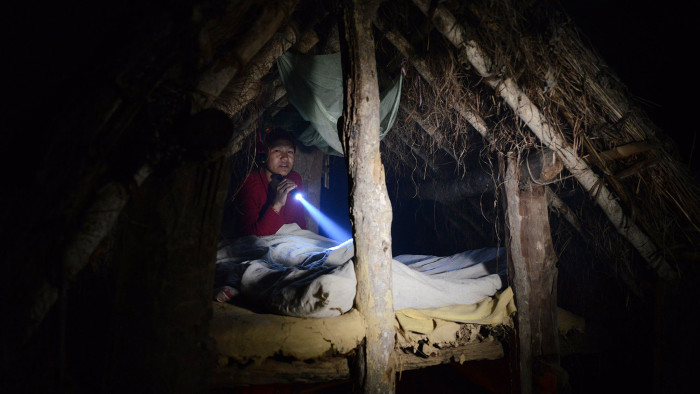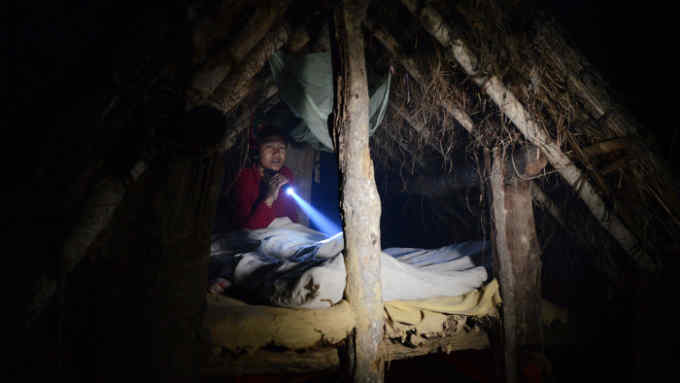Nepali women on their period sent out in the cold

Roula Khalaf, Editor of the FT, selects her favourite stories in this weekly newsletter.
When you’ve been invited to a friend’s home for dinner, you don’t usually expect to be told you have to eat alone in another room. My sister could hardly believe what she was told by her hosts in Nepal’s urbane capital Kathmandu in 2016. Her crime? She was on her period.
There is a toxic custom in Nepal called chhaupadi, which banishes women into seclusion during their periods. Menstruation is seen as unclean and menstruating women and girls are kept away lest they contaminate their surroundings. To varying degrees, it is enforced across villages and cities in Nepal and in parts of India.
In villages, it can mean living for days outside the family home in makeshift huts. Women in Nepal have died from carbon monoxide poisoning from cooking in these confined spaces and from snake bites. Others have been raped, as the huts are often placed away from homes.
Last year, a 15-year-old called Roshani Tiruwa was found dead in the hut she had been sent to. In the frigid cold of a Nepali winter, she had started a small fire to keep warm without realising that its smoke would prove lethal in the confined space. The fumes suffocated her to death.
The practice is also common in cities, where girls and women are not asked to live apart but are not allowed to enter the kitchen or come into close contact with male members of the family. Even middle-class Nepalis who send their children away to foreign universities often enforce the custom at home, reinforcing negative gender stereotypes over generations. When I asked my relatives in Kathmandu who practise chhaupadi why they still do, most pointed to religion. Hindu priests have supported the idea and back their views with reference to holy scriptures.
The religious roots of this practice are seen in another one that is prevalent in Nepal. Nepalis worship some young prepubescent girls as living goddesses, or kumaris. Once selected, these girls live lives of religious seclusion — even their families visit rarely — up until their first period. They are then considered impure and return to whatever can be salvaged of their old lives.
Society pays a steep price for perpetuating this stigma. First, girls miss school because they are isolated during their period. This means they are likely to do worse than male students, which reinforces the stereotype that they are less able. Almost 30 per cent of Nepali girls are thought to miss school because of their periods.
The problem is not restricted to Nepal. In India, almost a quarter of girls drop out of school once they start menstruating and even those who remain will miss around five days a month. This can lead to large differences in employment prospects between boys and girls. Studies show that if that gap could be bridged, it would increase GDP by up to 1.2 per cent every year.
Nepal also has a high maternal mortality rate — 258 mothers die from pregnancy-related causes for every 100,000 live births. That number is just four in Sweden and nine for the UK. Chhaupadi is connected to this problem: some women are banished to huts after childbirth as well, and denied nourishing food and postnatal care because they are seen as unclean.
So how can chhaupadi be relegated to history? Another Hindu custom, sati, whereby widows were once forced to jump on their husband’s funeral pyre, was outlawed by the British when they ruled India. It has now all but vanished.
Last month, the Nepali government took a similarly strong step, passing a law that criminalised the practice. But it is difficult to simply legislate away deep-seated customs. International intervention in terms of raising awareness through education could help, but there is also a danger of a backlash. Nepal is a predominantly Hindu nation — although Islam and Christianity have grown in popularity in recent years, especially among people of lower castes. Any attempt by western aid agencies to ban a practice that is sanctioned by religion could spark outrage and hurt the cause.
Domestic forces, then, must take the lead. If moderate Hindus argue against the practice, there is less room for conservatives to spread rumours about foreign interference. Progressive members of the Hindu clergy could also play a pivotal role by showing that the practices stem from a period when maintaining menstrual hygiene was more difficult. Modern sanitary products have changed this.
Chhaupadi has cost Nepali women dearly. Those with social influence will have to act to educate Nepalis about its dangers. Otherwise, young women will continue to pay for their failure.

Comments